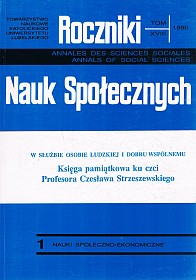Etyka religijna a praca zawodowa
Abstrakt
Having presented religious ethics as a philosophical science which normalizes social acts and actions of people, the author goes on to analyze, in the light of this ethics, the questions of work in order to consider them in comparison with class ideologies and in the dialogue with Polish representatives of the movement for the humanization of work. Using the term „religious ethics” the author pinpoints what ethical system he has in mind. The system in question here is an ethical system established by way of philosophical method from premisses and principles which are purely intellectual. From the philosophy of God he takes the truth that God has endowed man with reason, conscience and freedom. Thanks to reason man is able to get to know the norms of natural law. This is an ethics based on natural law, man’s autonomy and God’s revealed law. The author identifies religious ethics with the Catholic social teaching, which is not an ideology but is a transcendent theory in relation to the liberal ideology of capitalism and Marxist ideology of collectivism.
The Catholic social teaching, despite its religious assumptions, is, according to the author, a philosophical practical science and bears a universal character. The ideological systems, on the other hand, are a product of their historical epoch; they express the interests of only that part (of society) which they represent: the interests of a class, nation or political party. They play an instrumental role, subservient to the practice of accomplishing success at all costs. Ideologies are closed systems and they are mutually exclusive. The ideology of Marxist collectivism has imposed a political character on the economy and work as well as granted the State a rank of substantial being, and negated human rights. The idea of liberal capitalism was also conducive to the encroachments on working people’s rights, e.g. the right to get fair wages and to form associations. The Catholic social teaching regards these rights as natural rights. The crucial thing is to accept the workers’ right to private property. It was already Leo XIII who emphasized that one could not solve the question of the working people „if one does not put the holy character of the right to private property as a basic principle”.
The author criticizes the way in which the „humanization of work” was carried out in the People’s Republic of Poland. The main error consisted in the fact that the theory and practice of humanization were transferred from the domain of science onto the ideological ground. The error of Taylorism consists in the fact that the humanization of work has been reduced to the objective aspect of the process of work and isolated from human subjects. The author thinks that the humanization of work should be grounded on the recognition and respect for the rights of the working people on the principles of justice, love and solidarity as well as on the moral-religious motivation to work.
Copyright (c) 1990 Roczniki Nauk Społecznych

Utwór dostępny jest na licencji Creative Commons Uznanie autorstwa – Użycie niekomercyjne – Bez utworów zależnych 4.0 Międzynarodowe.


